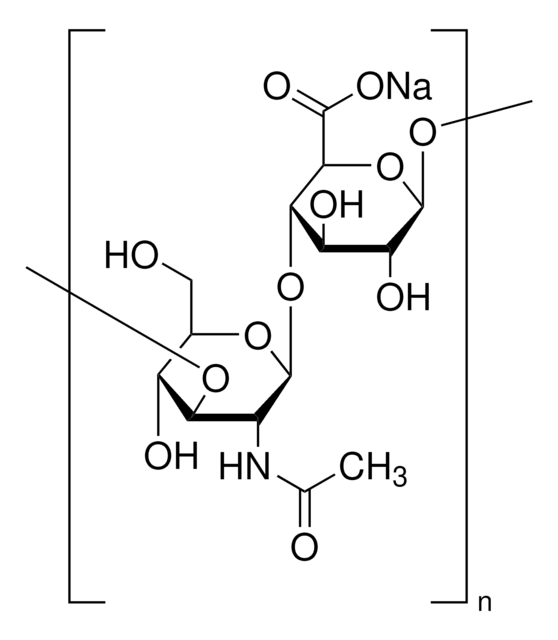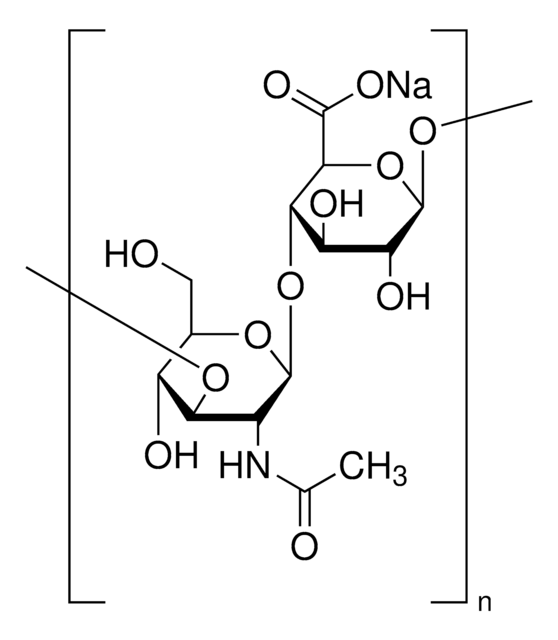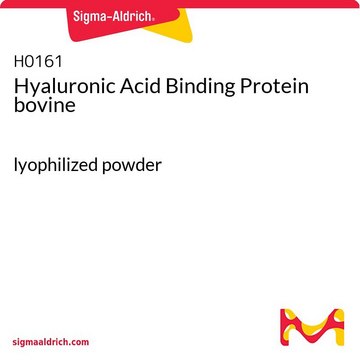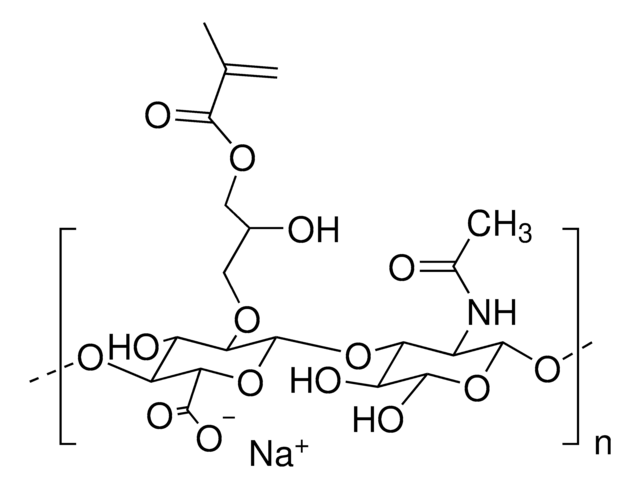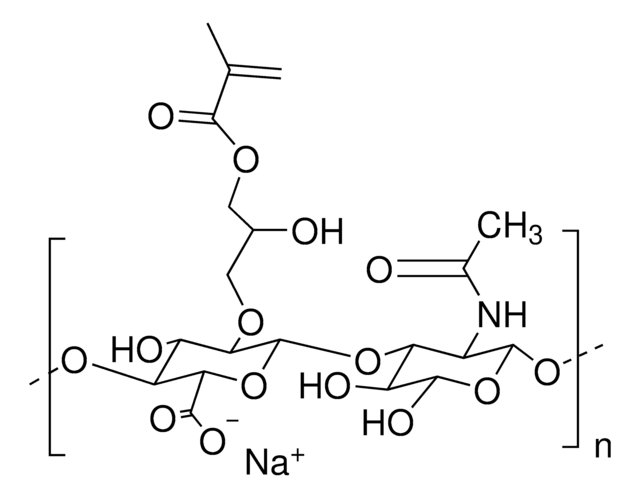924474
Hyaluronic Acid
Low Viscosity, Low endotoxin
Sinonimo/i:
3D bioprinting, HA, Hyaluronan
Autenticatiper visualizzare i prezzi riservati alla tua organizzazione & contrattuali
About This Item
Codice UNSPSC:
12352201
NACRES:
NA.23
Prodotti consigliati
Livello qualitativo
Forma fisica
(powder or chunk(s) or fibers)
Impurezze
<10 CFU/g Bioburden
<100 EU/g Endotoxin
Colore
white to off-white
Compatibilità
conforms to structure for NMR
Temperatura di conservazione
2-8°C
Descrizione generale
Hyaluronic acid (HA) is a linear polysaccharide of alternating D-glucuronic acid, and N-acetyl-D-glucosamine found in the extracellular matrix. HA is commonly chemically modified to form covalently crosslinked hydrogels. Other properties of HA include cell surface receptors CD44 and RHAMM recognition and degradation via hyaluronidases.
Applicazioni
HA is increasingly used for the following biomedical applications:
Our low endotoxin HA is tested for both endotoxin (< 100 EU/g) and bioburden (< 10 CFU/g) levels, so you can choose which material is right for your research.
- Cell migration
- Angiogenesis
- Viability
- Proliferation
Our low endotoxin HA is tested for both endotoxin (< 100 EU/g) and bioburden (< 10 CFU/g) levels, so you can choose which material is right for your research.
Codice della classe di stoccaggio
11 - Combustible Solids
Classe di pericolosità dell'acqua (WGK)
WGK 3
Punto d’infiammabilità (°F)
Not applicable
Punto d’infiammabilità (°C)
Not applicable
Scegli una delle versioni più recenti:
Certificati d'analisi (COA)
Lot/Batch Number
Ci dispiace, ma al momento non ci sono COA disponibili online per questo prodotto.
Se ti serve aiuto, non esitare a contattarci Servizio Clienti
Possiedi già questo prodotto?
I documenti relativi ai prodotti acquistati recentemente sono disponibili nell’Archivio dei documenti.
Tracey J Brown
Current pharmaceutical biotechnology, 9(4), 253-260 (2008-08-12)
Despite advances in chemotherapeutic regimens, the treatment of metastatic cancer remains a challenge. A key problem with chemotherapy drugs is nonspecific drug distribution, resulting in low tumor concentrations and systemic toxicity. The holy grail of clinical cancer research has been
Federica Camin et al.
Journal of agricultural and food chemistry, 58(1), 570-577 (2009-12-17)
H, C, and O stable isotope ratios and the elemental profile of 267 olive oils and 314 surface waters collected from 8 European sites are presented and discussed. The aim of the study was to investigate if olive oils produced
Xian Xu et al.
Soft matter, 8(12), 3280-3294 (2012-03-16)
Hyaluronic acid (HA) is one of nature's most versatile and fascinating macromolecules. Being an essential component of the natural extracellular matrix (ECM), HA plays an important role in a variety of biological processes. Inherently biocompatible, biodegradable and non-immunogenic, HA is
Kevin T Dicker et al.
Acta biomaterialia, 10(4), 1558-1570 (2013-12-24)
Hyaluronan (HA) is a linear polysaccharide with disaccharide repeats of d-glucuronic acid and N-acetyl-d-glucosamine. It is evolutionarily conserved and abundantly expressed in the extracellular matrix (ECM), on the cell surface and even inside cells. Being a simple polysaccharide, HA exhibits
Il team dei nostri ricercatori vanta grande esperienza in tutte le aree della ricerca quali Life Science, scienza dei materiali, sintesi chimica, cromatografia, discipline analitiche, ecc..
Contatta l'Assistenza Tecnica.
